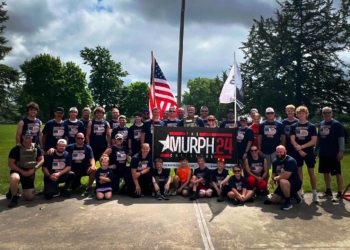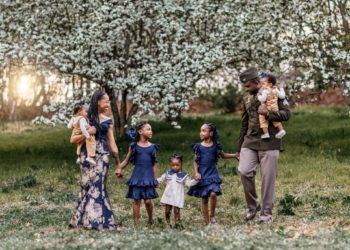Jessica Purcell is a mother, wife, daughter, sister, Army Reserve captain and an Air Force Civilian employee at U.S. Central Command at MacDill Air Force Base in Tampa, Florida. She is also a warrior as she battles cancer, refusing to be defined by a diagnosis.
“Cancer is an obstacle in my life but it will not define who I am as a person,” she said. “I don’t ever want my kids to think I gave up. I will fight with all my heart and every ounce of my soul. No amount of pain will ever stop me. I’m a mama on a mission.”
And that mission has multiple goals: to survive cancer and inspire other women while she does it.
“At the end of the day I was chosen for this journey because I’m strong enough to handle it,” she said. “This isn’t about me. It’s about the greater good. It’s about other mothers, wives, sisters, and daughters — just like me. If I can get through my days, other mothers struggling with cancer — or anything — will, too.”

In 2017, Purcell was pregnant with her first child, a daughter named Josephine, when she felt discomfort with a lymph node in her underarm. Her doctor dismissed it as being hormones or pregnancy-related.
“I thought something might be off, but as a first-time mom I trusted the doctor over my instincts,” Purcell said. “I should’ve followed my gut.”
Consumed with a newborn, Purcell didn’t think about the issue with the lymph node until April 2018 when, while weaning Josephine from breastfeeding, she felt a new lump in her breast. An eventual mammogram was scheduled and then cancelled when she learned she was pregnant with her son. At an eight-week prenatal check-up for her son, her doctor agreed Purcell needed an ultrasound that in turn led to the biopsy of the lump.
“The doctor kept telling me I was probably fine and it was probably just a cyst; the tests were really just precautions. I was an otherwise healthy 35-year-old pregnant woman. Cancer couldn’t happen to me,” Purcell said.
But on Aug. 24, 2018, Purcell’s life was rocked.

“I remember the doctor rolled over to me on one of those metal stools and her knees practically touched mine. Time stood still,” she said.
Purcell, mother to then 13-month old Josephine and nine-weeks pregnant with her son, learned the lump in her breast was invasive ductal carcinoma, one of the most common types of breast cancer.
“You hear cancer and — I didn’t want to die,” she said. “And I was terrified for my unborn child.”
Purcell went into warrior mode.
She underwent a left radical mastectomy and a complete axillary lymph node dissection, which removed the lymph nodes under her left arm. At 20-weeks pregnant, Purcell started chemotherapy. She completed 12 rounds, which included injections to stimulate her bone marrow, all while her son developed in her womb.
“The whole time, I was not concerned for myself but for my daughter and my unborn son. There’s no backing down from cancer. I had to be aggressive,” she said. “I constantly had to advocate for myself because it wasn’t just for me — it was for my son, too.”
This past March, Purcell delivered a healthy boy via cesarean section. She named him Jameson in honor of her late grandfather, James, who passed away from cancer when she was 10.

“I remember holding Jameson and looking at him — just in awe. He was perfect. He’d been through every test, injection, surgery, and treatment with me. He’s my little miracle,” she said.
While Purcell gave birth to Jameson, doctors removed her left ovary and fallopian tubes after they noticed a tumor on her ovary. The pathology showed that this ovarian tumor was benign. Four months after Jameson’s arrival, as she navigated being a mom to two children under the age of two, Purcell completed a six-and-a-half-week course of radiation therapy.
Purcell’s journey with cancer isn’t over yet. On July 11, the day after she completed her last day of radiation, Purcell had a liver biopsy for lesions highly suspicious for metastasis. A few days later, she learned the cancer had metastasized to her liver, leaving her with a new diagnosis of Stage 4 metastatic breast cancer. The news was devastating but didn’t debilitate her spirit.
“I’m refusing to accept this diagnosis as a death sentence,” she said. “I will be here for my family. I’m fighting and being aggressive. God’s got this!”
Purcell is navigating her treatment plan, which may include a liver ablation — a procedure that will insert a rod into her liver near the lesions and blast the area with microwaves, along with monthly hormonal injections to shut down her remaining ovary. She may also be given more systemic therapy: possibly an aromatase inhibitor to reduce production of estrogen alongside a chemotherapy pill daily for the rest of her life. She’s getting a second opinion.
“I want to discuss my options, explore immunotherapy and other ways to suppress hormones since my cancer is fueled by hormones,” she said.
Purcell, her signature long hair now short as a reminder of all she has overcome, is ready for her next battle — not only for her own survival but to give a voice to other women like her.
“I represent a small community of women. I’m telling my story — I’m the voice — for all of us. I’m on a mission to bring awareness — healthy women can get cancer while pregnant and still have a healthy baby. This is my story but it’s not about me. It’s a story that could easily be any woman’s story.”
Read comments












































